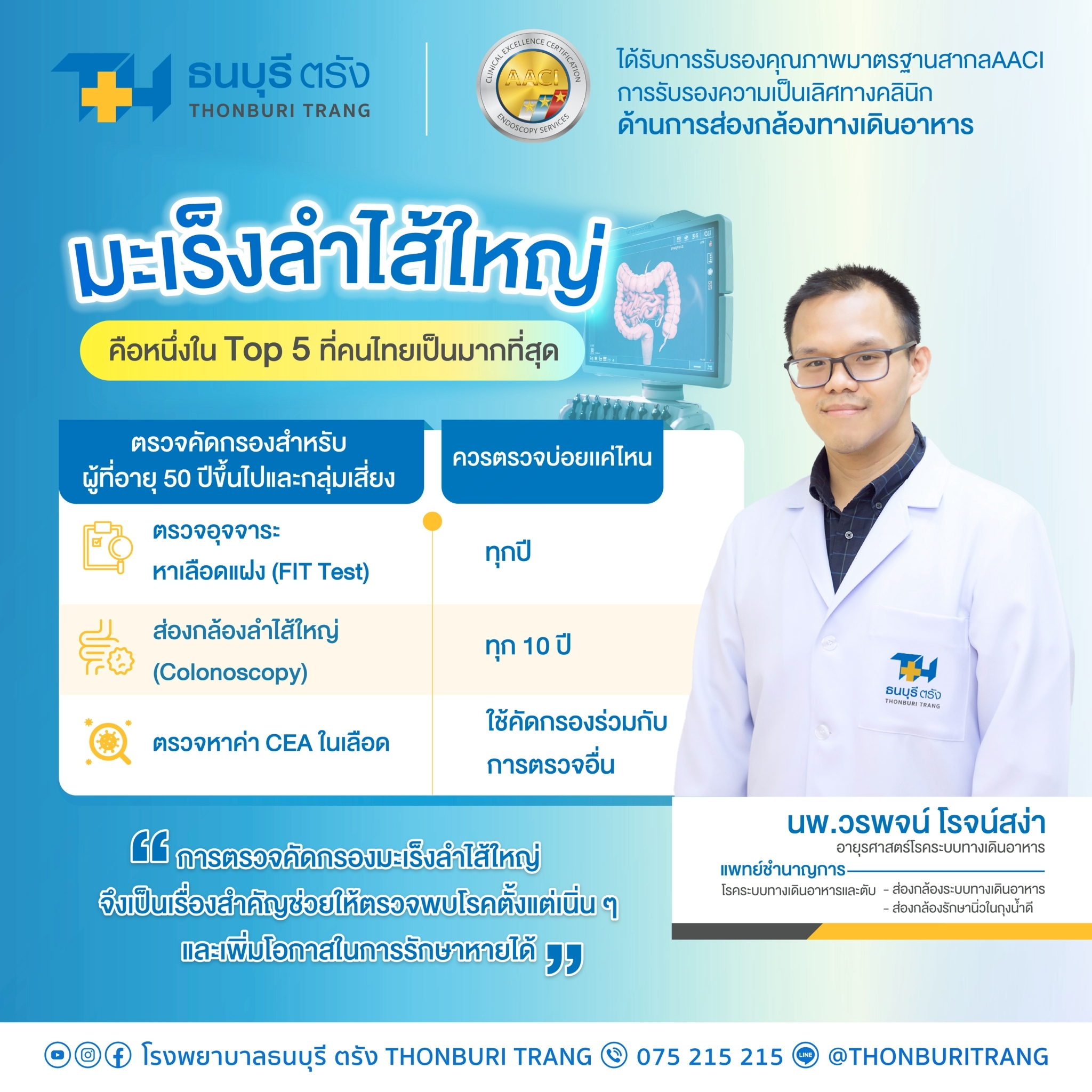 Thonburi Trang
Thonburi Trang

ผู้ที่มี ไวรัสตับอักเสบบี/ซี (HBV/HCV)
ผู้ที่มี ตับแข็ง/พังผืดตับ จากสาเหตุใดก็ตาม
ดื่มแอลกอฮอล์หนัก ต่อเนื่อง
ไขมันพอกตับ/เบาหวาน/อ้วนลงพุง (NAFLD/NASH)
คนในครอบครัวเคยเป็นมะเร็งตับ เพศชาย อายุ >40 ปี
สัมผัสสารพิษเชื้อรา (อะฟลาทอกซิน) จากอาหารเก็บไม่ดีเป็นประจำ
ถ้าเข้าข่ายข้อใดข้อหนึ่ง ควรเข้าระบบคัดกรองสม่ำเสมอ
น้ำหนักลด/เบื่ออาหาร, จุกแน่นชายโครงขวา, อ่อนเพลียเหลืองตาเหลืองตัว, ท้องโตผิดปกติ/มีน้ำในท้อง, คันทั้งตัว, ปัสสาวะเข้ม—พบอาการเหล่านี้ อย่ารอดู
อัลตราซาวนด์ช่องท้อง + เลือด AFP : ทุก 6 เดือน
ตรวจเลือดดูการทำงานของตับ, HBV/HCV, และประเมินพังผืด/ความเสี่ยงเพิ่มเติม
หากอัลตราซาวนด์ผิดปกติ → CT/MRI ตับแบบไตรเฟส เพื่อยืนยันและจัดแผนรักษา
เหตุผลที่ “6 เดือน”: เนื้องอกตับโตได้เร็ว การ间ห่างยาวเกินไปเพิ่มโอกาสพลาดระยะรักษาได้
วัคซีนไวรัสตับอักเสบบี สำหรับผู้ที่ยังไม่มีภูมิ
รักษาไวรัสตับอักเสบซี (มียาที่หายขาดได้ในรายเหมาะสม)
ลด–เลิกแอลกอฮอล์ คุมเบาหวาน–ไขมัน–น้ำหนัก
ระวัง ยาสมุนไพร/ยาแก้ปวดบางชนิด ใช้เมื่อจำเป็นและมีคำแนะนำ
อาหารสะอาด ไม่กินถั่ว/ธัญพืช/อาหารแห้งที่ขึ้นรา
ทีมแพทย์จะพิจารณาแนวทางที่เหมาะกับระยะโรคและสภาพตับ เช่น
ผ่าตัดตัดก้อน, จี้ทำลายก้อนด้วยความร้อน (RFA/MWA), อุดหลอดเลือดเลี้ยงก้อน (TACE), หรือ ยาระบบ/ภูมิคุ้มกันบำบัด และเชื่อมต่อเครือข่ายเพื่อส่งต่อในกรณีที่ต้องการการรักษาขั้นสูง
คลินิกทางเดินอาหาร–ตับ ดูแลโดยอายุรแพทย์ระบบทางเดินอาหาร
แนวทางคัดกรองเป็นระบบ พร้อมติดตามนัดอัตโนมัติ
ตรวจเลือด–อัลตราซาวนด์–เอกซเรย์–CT/MRI (ตามข้อบ่งชี้) และประสานสหสาขาวิชาชีพ
ต้องเริ่มคัดกรองเมื่อไหร่?
ทันทีที่ทราบว่าอยู่ในกลุ่มเสี่ยง โดยเฉพาะผู้มี HBV/HCV หรือตับแข็ง
ไม่มีอาการ ต้องตรวจไหม?
ควร—มะเร็งตับระยะแรกมักเงียบ การคัดกรองช่วยเจอเร็วและรักษาได้
AFP ปกติ แปลว่าไม่มีมะเร็งแน่ๆ ใช่ไหม?
ไม่เสมอไป จึงต้องใช้ อัลตราซาวนด์ร่วมทุกครั้ง
ดื่ม “นานๆ ครั้ง” เสี่ยงไหม?
ยิ่งดื่มบ่อย/ปริมาณมากยิ่งเสี่ยง โดยเฉพาะเมื่อมีโรคตับเดิม
คลินิกทางเดินอาหาร–ตับ โรงพยาบาลธนบุรี ตรัง (THG)
โทร 075-215-215 • Line/FB: @THONBURITRANG • เปิดบริการทุกวัน